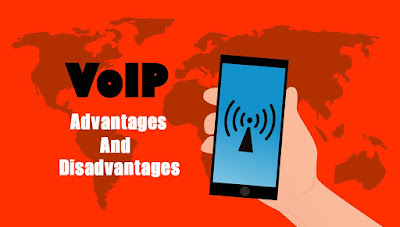What is VoIP ?
Voice over Internet Protocol (VoIP) is a type of technology which allows making of phone calls through
the internet. This includes phone connections such as internet telephony, IP telephony and broadband telephony.
How does VoIP work ?
In this technology, all the voice calls are converted into digital data so that it can be transferred through the internet. Currently, apps like WhatsApp, Facebook Messenger, Viber, and Skype use VoIP technology to make voice calls. Not only voice calls, even video calling, file sharing and other communications are possible using VoIP.
What are the types of VoIP ?
Based on the way of how digital communication occurs, there are three types of VoIP technologies. Those are the Software VoIP, On-Premise VoIP and Hosted VoIP. Although VoIP offers many benefits over traditional phone system, it aren't flawless. By weighing the pros and cons, you can decide if it will be right choice for your business.
In this article, let's look at the 5 Advantages and Disadvantages of VoIP | Limitations & Benefits of VoIP. At the end of this post, you will know the pros and cons of using VoIP.
Let's get started,
Advantages of VoIP
1. Cost
By opting for a VoIP telephone system, businesses will be able to enjoy significant amount of cos savings. This amount has found to be less than half of what is spent on regular telephone lines.
As long as the users are having an internet connection, they can make free calls to any part of the world. The users have to settle the bill corresponding only to the network.
2. Accessibility
A VoIP is based on the internet. Hence, it is not geographically restricted. Irrespective of the location and time, VoIP allows to make phone calls if they are having internet access. VoIP provides the ability to take phone calls from any location.
This is especially beneficial for businesses since their employees need not to be present at the office all the time. They can work conveniently from their home with a smartphone or a laptop.
3. Mobility
VoIP allows voice calls to be made even while a user is moving. Each virtual number assigned through the IP address is completely portable. A business phone system can be accessed from any location regardless of the device it is used in.
Even if a worker is remote from the office, the caller from the other end will see it as a business line. Therefore, VoIP technology is mainly preferred by workers who constantly travel.
4. Scalability
Unlike a traditional phone system, a VoIP is not restricted on the number of phone that can be added. Only restriction that is made in VoIP is bandwidth.
As the business grows, any amount of phone lines can be added or removed. It does not require purchasing of expensive hardware.
5. Quality
If you have a reliable internet connection with good amount of bandwidth, high quality calls can be achieved using VoIP. Even multiple and simultaneous calls can be made without affecting the sound quality.
In the contrary to the traditional phone system. it suffers less from delays and background noise. And with techniques such as noise cancelling microphone more crystal clear call quality can be guaranteed.
Disadvantages of VoIP
1. Security
Similar to other internet technologies, a VoIP is prone to security threats. Using VoIP, malwares, viruses and ransomware can be infected onto your system.
Other than that, a VoIP connected system can also experience identity theft, call tampering, spamming and other dangerous attacks. Hence, to avoid such negative impacts, it is necessary to implement right security measures.
2. Reliability
A VoIP hardware constantly needs power from an electrical power supply. Similar to other types of electronic devices, VoIP hardware could go down once there is a power outage.
In order to avoid such impacts, it is recommended to install either a generator or UPS. However this can be prevented only for few minutes.
3. Internet Dependency
The operations of VoIP system entirely depends on the internet connection. The VoIP cannot transmit signals unless there is either 3G/4G/5G/LTE or broadband networks.
This also means that if your internet connection is not stable, it could cause frequent disruptions. Moreover, when the connection goes down, you cannot make VoIP calls until the connection is restored.
4. Emergency Situations
A call in VoIP is made between two IP address rather than a physical address. Therefore, it is difficult for a third party to track the location of a call.
In this case, absolutely no data can be collected from a cell tower or GPS. This is problematic in a situation like 911 where emergency call needs to be traced.
5. Technical Issues
VoIP phone systems are subjected to various technical issues since they are based on the internet. Most common issues faced during a VoIP call are noise, echo and delay. If there is no sufficient bandwidth, the calls may eventually experience delays, lag or disconnection.








No comments:
Post a Comment